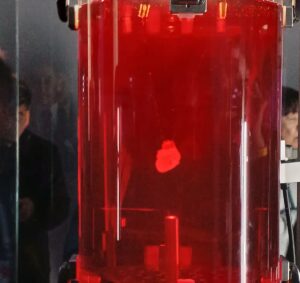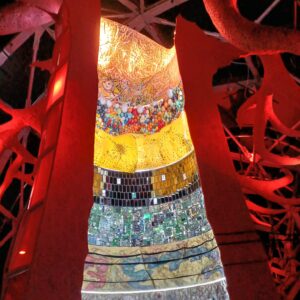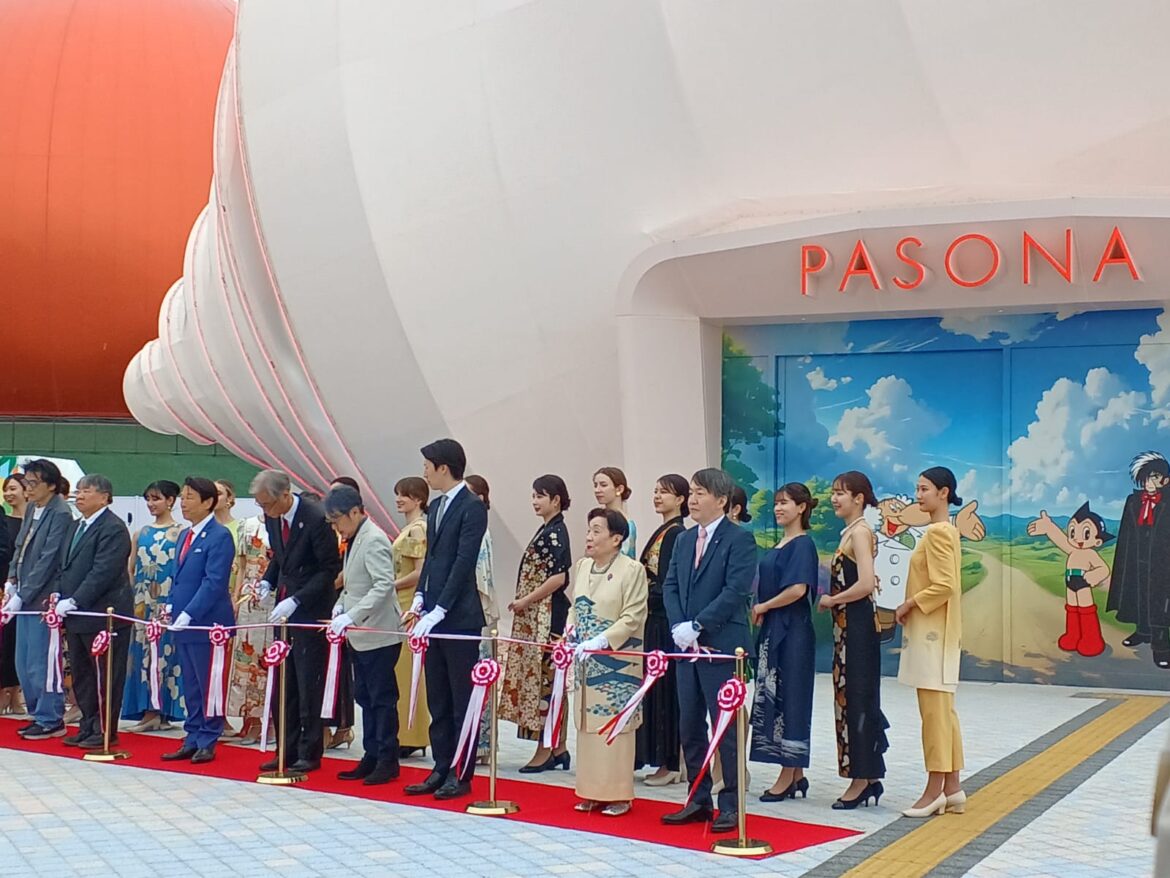Pasona Group Inc., a leading Japanese company in the field of employment and human resources and Italy’s partner at the Osaka 2025 World Expo, today organized a ceremony and a press event in Yumeshima to mark the completion of its pavilion at the Expo, “Pasona Natureverse”: a large thematic space conceived as a thank you to life, which will present to Expo visitors the wonders of biology, science and technology such as the IPS Heart made with pluripotent stem cells. The ceremony was attended by numerous personalities and representatives of companies and societies directly involved in the initiative: Jun Takashina, Deputy Secretary General of the Japan Expo Association; Yasuyuki Nambu, President and CEO of the Pasona Group; Yoshiki Sawa, Professor Emeritus of Osaka University and Executive Producer of “Pasona Natureverse”; Takashi Ikegami, professor emeritus of the University of Tokyo and supervisor of the project “The Tree of the Evolution of Life”; Satoshi Itasaka, president of The design labo inc. The ceremony was also attended by designer Harumi Fujimoto; Masahiko Miyata, Chairman of the Board of Directors of Asahi Intecc Co., Ltd., for the “Medicine of the Future” project; Yoshihisa Kainuma, president and CEO of MinebeaMitsumi Inc., which is contributing to the Pasona Pavilion with the project “The Sleep of the Future”; and Yoshiyuki Sankai, president and CEO of Cyberdyne, a company that will enrich the contents of “Pasona Natureverse” with the project “The future me”.
 The Ips Heart, a cardiac muscle bioengineered in the laboratory thanks to pluripotent stem cells
The Ips Heart, a cardiac muscle bioengineered in the laboratory thanks to pluripotent stem cells
The pavilion, conceived as a true ode to life, presents the vision of a future society characterized by the harmonious coexistence of humans, technology and nature, through a variety of exhibitions centered on the three themes of “Body, Mind and Bonds”. Astro Boy (Tetsuwan Atomu), and Black Jack, famous characters of the Japanese cartoonist, animator and television producer Osamu Tezuka, act as exceptional guides and navigators for visitors to the pavilion: an ammonite-shaped structure, which recalls life in one of its most fascinating primordial forms, and also symbolizes its circularity, as explained by the president of Pasona, Yasuyuki Nambu, during the event. Astro Boy himself sits at the top of the pavilion, with an outstretched arm pointing to the island of Awaji. For years, Pasona has launched a vast program of socio-economic and cultural revitalization in Awaji, also supported by important infrastructural works, giving concrete form to its vision of a society based on humanistic principles and on the harmonious combination of inclusion, technological progress and respect for nature.
Upon entering the pavilion, visitors are first greeted by the area dedicated to the “History of Life” (“History of Life Zone”). This introductory space is dominated by an imposing installation, “The Tree of the Evolution of Life”: halfway between a tree and a circulatory system, the installation traces 3,8 billion years of evolution and resilience of biological life on Earth, up to the present – dominated by the promises and challenges of technological evolution and artificial intelligence – and beyond, towards a future beyond time and space. The branches that unfold from its central trunk symbolize the countless opportunities offered by the future. At the base, however, the entire structure is reflected in a mirror, which symbolizes the transitory nature of the individual declinations of life and its eternal cyclicality.
 “The Tree of the Evolution of Life”, an installation that traces 3,8 billion years of evolution and resilience of biological life on Earth
“The Tree of the Evolution of Life”, an installation that traces 3,8 billion years of evolution and resilience of biological life on Earth
The tree of the Evolution of Life is followed by an exhibition space where you can also admire the largest specimen of ammolite in the world: it is a gem of biological origin formed by ammonite fossils, dating back to around 70 million years ago. This leads to the area dedicated to the Body (“Body Zone”), dominated by the Ips Heart, an extraordinary discovery of medical science developed by Dr. Yoshiki Sawa, a luminary of regenerative medicine: a cardiac muscle with a diameter of around 3,5 centimetres, bioengineered in the laboratory thanks to pluripotent stem cells and suspended in a culture solution. As explained by Akira Senju, composer and sound producer of “Pasona Natureverse”, the entire pavilion “breathes” to the rhythm of the Ips Heart: the music and ambient sounds that accompany visitors in their exploration of the pavilion were composed on the basis of its irregular beat, in the spirit of gratitude towards life.
In addition to the Ips heart, the pavilion illustrates to visitors many other innovations in the field of medical science and technological discoveries that benefit the quality of life, providing an overview of the “Future of Medical Care”: flying operating rooms, capable of providing emergency medical treatments wherever needed, and systems for remote medicine and surgery, developed by Obayashi Corporation and Asahi Intecc Co., Ltd; and the latest technological discoveries of the company MinebeaMitsumi to optimize the quality of sleep, a fundamental factor for human health. Nutrition is another crucial piece for human health, dependent on the preservation of soil, water and their microbiomes: “wonders of the Earth” that are also the protagonists of this section of the pavilion, through an installation that leads visitors to discover the subsoil and its extraordinary complexity.
The “Body Zone” also hosts “Future Me,” an exhibition curated in collaboration with robotics company Cyberdyne Inc. The exhibition depicts a future society characterized by the seamless integration of humans and cyber-physical spaces, with humans, AI, and robots supporting each other: the company presents here exoskeletons with neural interfaces and robots capable of acting as real avatars of people from miles away. The exhibition is the stage for a series of innovative technologies that seamlessly integrate humans, cyberspace, and physical spaces, enhancing people’s physical capabilities and monitoring their health status: among these, the compact wearable sensor “Cyvis,” capable of collecting information on cardiac and neurological activity and the condition of the body, and “Acoustic X,” a system that uses photoacoustic technology to visualize microblood vessels in real time through contact with the skin.
The last section of “Pasona Natureverse” is dedicated to the mind and bonds between individuals (“Mind/Bonds Zone”), and presents the programmatic and proactive dimension of Pasona’s vision, also encapsulated in the name of the pavilion: a world where the aspirations and contributions of each individual can be realized and valued, in a context of coexistence between technology and nature. And a society where individuals are linked by mutual compassion and gratitude for the gifts of nature: a precious asset to be preserved and valued. “Pasona Natureverse” presents human society itself as an integral part and phenomenon of the natural world, and invites visitors to rediscover gratitude for life as a universal principle and in all its forms, transmitting it to future generations. “I am overwhelmed with emotion at being able to inaugurate this pavilion in the image of the future world that I imagined as a child, looking at the moon rocks,” commented Pasona President and CEO Yasuyuki Nambu during the event.
As highlighted by Nambu, “Pasona Natureverse” reflects the philosophy on which the group’s activity is based: providing “solutions to society’s problems”. The conception of society promoted by the Japanese human resources giant passes through the commitment to addressing current challenges such as health and quality of life, and through cultural creation programs that Pasona has promoted since the 2008s. Since 2025, in particular, the island of Awaji, in the prefecture of Hyogo, has become the symbol and laboratory of this vision through a vast socioeconomic and cultural revitalization project aimed at “attracting human resources” and making it a true “Island of arts and culture”. Pasona’s commitment to supporting the arts and culture, and Nambu’s love for Italy, are the basis of the partnership announced last February between Pasona Group and Italy, in order to realize the intense cultural program of music and performing arts of the Italian Pavilion at the Osaka 2025 World Expo. As highlighted last February by Nambu and the Commissioner General for Italy and Expo XNUMX, Ambassador Mario Vattani, the partnership will not end with the Expo, but will continue in the future to further expand the diffusion of Italian culture in Japan, and to create bonds and connections between artists and academic and cultural institutions of the two countries.
Read also other news on Nova News
Click here and receive updates on WhatsApp
Follow us on the social channels of Nova News on Twitter, LinkedIn, Instagram, Telegram


AloJapan.com